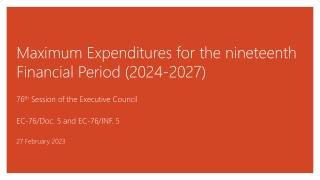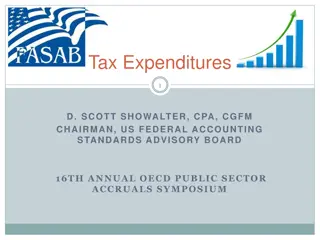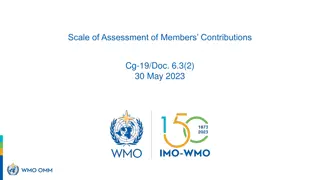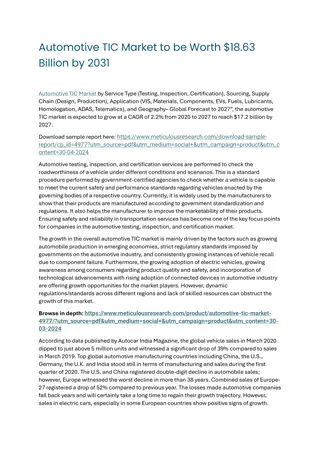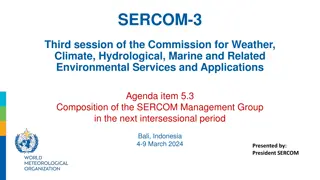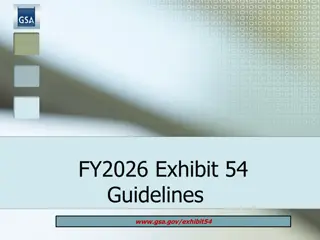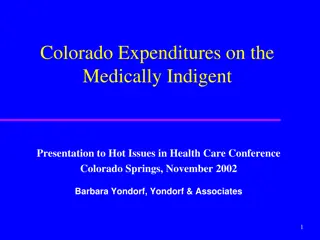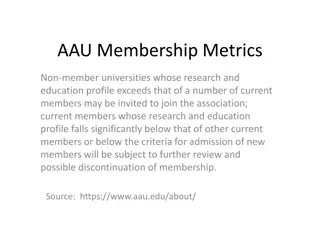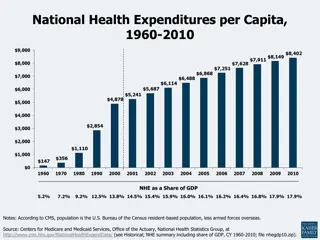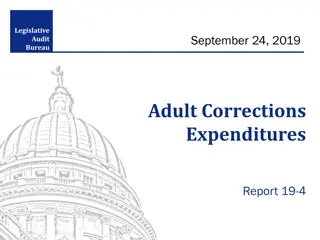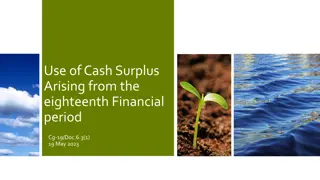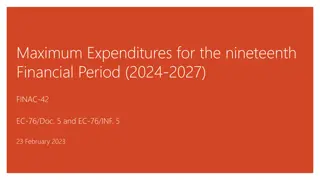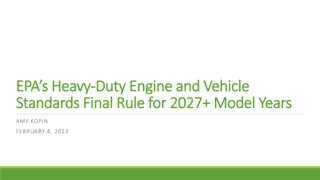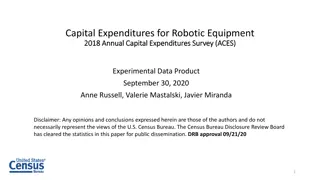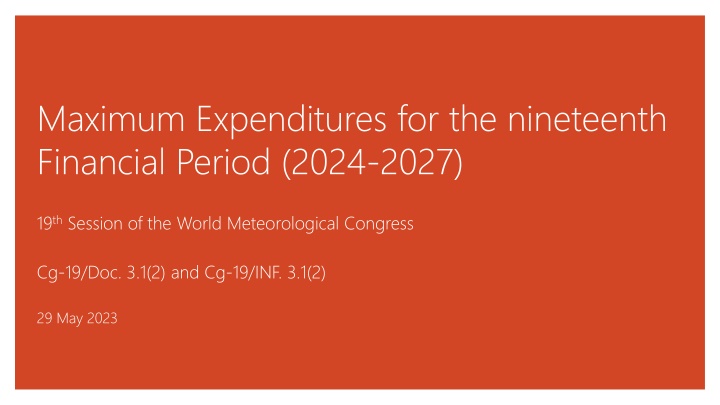
Revised Proposal for Maximum Expenditure at World Meteorological Congress
"Learn about the revised maximum expenditure proposal for the nineteenth financial period (2024-2027) presented at the World Meteorological Congress. Key priorities, funding adjustments, and committee feedback are discussed in detail."
Uploaded on | 0 Views
Download Presentation

Please find below an Image/Link to download the presentation.
The content on the website is provided AS IS for your information and personal use only. It may not be sold, licensed, or shared on other websites without obtaining consent from the author. If you encounter any issues during the download, it is possible that the publisher has removed the file from their server.
You are allowed to download the files provided on this website for personal or commercial use, subject to the condition that they are used lawfully. All files are the property of their respective owners.
The content on the website is provided AS IS for your information and personal use only. It may not be sold, licensed, or shared on other websites without obtaining consent from the author.
E N D
Presentation Transcript
Maximum Expenditures for the nineteenth Financial Period (2024-2027) 19thSession of the World Meteorological Congress Cg-19/Doc. 3.1(2) and Cg-19/INF. 3.1(2) 29 May 2023
Process for Preparation of Revised Proposal Original Proposals presented at FINAC and Day 1 of Congress Budget Committee met twice 23 May 26 May Revised Maximum Expenditure proposal reviewed by Budget Committee for: Overall Maximum Expenditure amount Approach to funding Key Priority Areas 2
Summary of comments on Original Proposal Proposal at 6.9% growth was not affordable Proposal at ZNG did not allow for sufficient funding of key priority areas ZRG scenario (2.4% growth): Appropriately addressed full funding for EW4All, ERP and IT Strategy Should be updated to: remove proposed de-prioritizations of capacity development and WIGOS/GBON that were not supported by Members further consider the expected level of extrabudgetary contributions for some key priority areas remove funding of Regional Office Reform as decisions of the EC Task Force are not yet completed 3
Revised Maximum Expenditure Proposal Revised Maximum Expenditure Proposal presented to the Budget Committee on 26 May contained: Proposal at 2.5% growth Included return of all funding for capacity development and WIGOS/GBON that had originally been de-prioritized Continued full funding of EW4All, ERP and IT Strategy, as well as the inclusion of one staff to support the implementation of the Plan of Action for Hydrology Limited regular budget funding for GGGW to one staff for an initial two-year period plus CHF 25,000 for activities with remaining need to be funded by extrabudgetary contributions Removed regular budget funding for Regional Office reform activities Presented potential resources from extrabudgetary contributions and level of confidence regarding receipt of such contributions 4
Revised Maximum Expenditure Proposal Budget Committee on 26 May: Stated the need to ensure some level of regular budget funding for each Key Priority Area to show WMO commitment and for attracting voluntary contributions Added funding for certain activities under SO 1.5 - Cryosphere and downstream impacts Confirmed Regional Office reform activities should not be included in the maximum expenditure proposal to be funded by other mechanisms once approach is known Requested Secretariat to identify efficiencies that would allow for incorporating the priorities while keeping the maximum expenditure level at 2.5% growth Requested Congress to include a request for the Secretary-General, in collaboration with Members, to mobilize extrabudgetary contributions to accelerate, expand and/or scale up the implementation of the Strategic Plan for 2024 2027, with particular emphasis on Early Warnings for All, the Global Greenhouse Gas Watch initiative, Cryosphere and downstream impacts and the implementation of the Plan of Action for Hydrology. 5
Revised Maximum Expenditure Proposal Additional Economies and Efficiencies Review of staffing requests under proposed scenario resulted in downgrade of an EW4All position from P-4 to P-3 Expected operational efficiencies from the implementation of the ERP and IT Strategy in the second biennium Secretariat will continuously review the method of implementation and collaboration to identify operational efficiencies during the implementation of the programme Efficiencies allowed to reduce maximum expenditure level from 2.5% growth to 2.4% growth (ZRG) 6
Revised Maximum Expenditure Proposal (in thousands of CHF) Unfunded amount (from original proposal) Forecast related extrabudgetary contributions Confidence Revised proposal Others financing alternatives Budget Element Baseline level (excluding EW4All) EW4All ERP implementation IT Strategy Global Greenhouse Gas Watch Plan of Action Hydrology Cryosphere 267,124.0 5,962.3 1,750.0 1,437.9 601.4 865.8 - - - - - - - - 31,000 + ..x - - - - - 2,050 3,000 + . 5,000 + . 1,070 . - 1,070 330.0 RO Reform Total Resulting Percentage to ZNG - 3,200 - 3,200.0 278,071.4 2.4% 7
Revised Maximum Expenditure Proposal Proposed adjustments to DOC 3.1(2) from Budget Committee Requests the Secretary-General, in collaboration with Members, to mobilize extrabudgetary contributions to accelerate, expand and/or scale up the implementation of the Long-term Goals and Strategic Objectives of the Strategic Plan for 2024 2027, with particular emphasis on Early Warnings for All, the Global Greenhouse Gas Watch initiative, Cryosphere and downstream impacts and the implementation of the Plan of Action for Hydrology. Recommends the Executive Council allocate any resulting cash surplus from the eighteenth financial period and savings that may be realized during the first biennium of the nineteenth financial period, if any, to support Early Warnings for All, Cryosphere and downstream impacts, the implementation of the Plan of Action for Hydrology and, upon the outcome of the work of the Task Force on the Comprehensive Review of the WMO Regional Concept and Approaches, the implementation of the Task Force s recommendations 8

